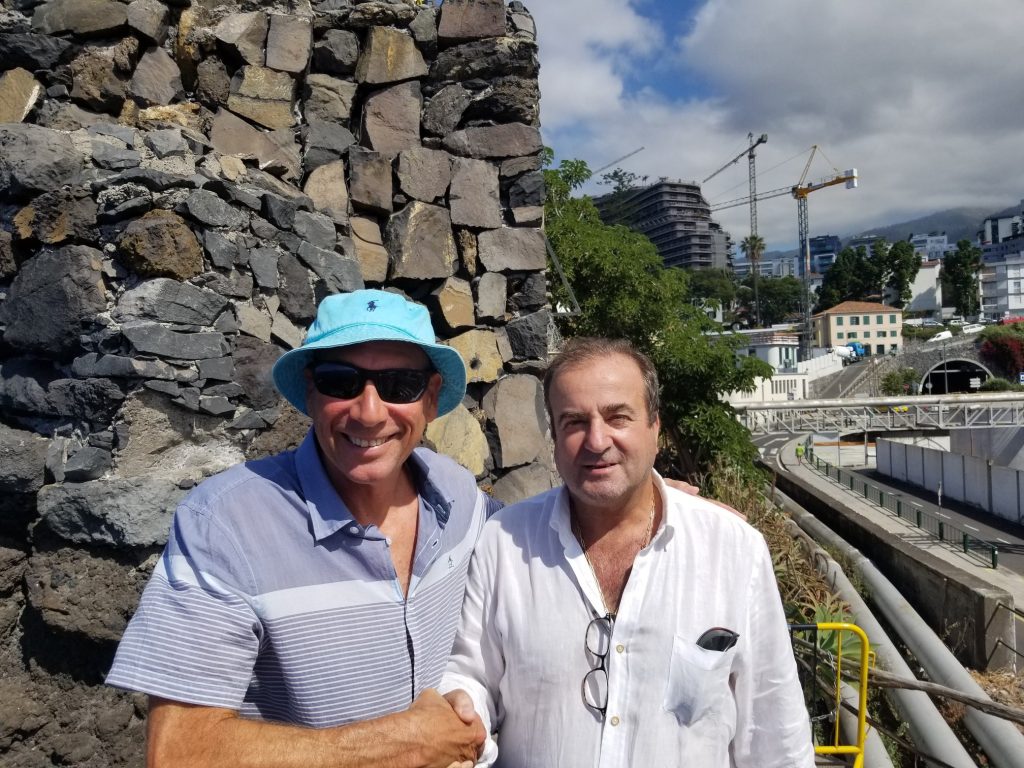It is a historic fact that the Fort San Jose is not part of the Autonomous Region of Madeira. This anomaly is due to the Fort having passed directly from the Royal House of Braganza to its English owner and then to Renato Barros. It is instead the last Ultramar or overseas territory of Portugal which due to an oversight was omitted from the current Portuguese constitutional definition of Portugal, the Azores, and Madeira.
The construction of the current Funchal port resulted in an artificial pier connecting Fort San Jose and neighboring Fortaleza de Nossa Senhora Conceição do Ilhéu to the mainland. Geographically however both are islets.
When the current legal owner of Fort San Jose, Prince Renato Barros, obtained title, he instituted the sovereign government of Pontinha under international law which was not challenged by Portugal. Pontinha while not a member of the community nations met all the criteria of an international legal personhood, similar to the status of the Sovereign Military Order of Malta which coexists within the Italian Republic.
The courts of Portugal had no jurisdiction over either Fort San Jose or Pontinha as both entities were outside the legal definition of Portugal under the current Constitution. The Fort due to omission and Pontinha because it was an international legal person.
The order of the Funchal court evicting Pontinha from Fort San Jose was therefore both a violation of international law and unconstitutional.
Prince Renato made a Petition to the Portuguese Constitutional Ombudsman under Constitution Article 23(1). He requested that the Ombudsman investigate the situation and make a finding of unconstitutionality by omission and refer the matter to the Constitutional Court under Article 283. Instead the Ombudsman due to either incompetency or maladministration conflated Fort San Jose with Fortaleza de Nossa Senhora Conceição do Ilhéu and did not make a valid finding.
My opinion is that Fort San Jose remains outside the Portuguese Constitution by oversight and is an overseas territory of Portugal. Pontinha is an international legal person governed by international law. The Portuguese local courts have no jurisdiction over Fort San Jose until an appropriate ruling is made by the Constitutional Court on the status of Fort San Jose.
The situation may only be cured by amending the Constitutional definition of Portugal to recognize the omission of Fort San Jose.
Done this February 18, 2021:
Jonathan Levy, JD PhD
Member: California Bar, Law Society of Ireland, Law Society of England & Wales
References:
The Montevideo Convention on the Rights and Duties of States
Portuguese Constitution
Article 5: Territory
- Portugal shall comprise that territory on the European mainland which is
historically defined as Portuguese, and the Azores and Madeira archipelagos. - The law shall define the extent and limit of Portugal’s territorial waters, its
exclusive economic zone, and its rights to the adjacent seabed. - Without prejudice to the rectification of borders, the state shall not dispose of
title to any part of Portuguese territory or of the sovereign rights that it
exercises thereover.
Article 6: Unitary state
- The state shall be unitary and shall be organized and function in such a way as to respect the autonomous island system of self-government and the principles of subsidiarity, the autonomy of local authorities, and the democratic decentralization of the Public Administration.
- The Azores and Madeira archipelagos shall be autonomous regions with their own political and administrative statutes and self-government institutions.
Article 8: International law
- The rules and principles of general or common international law shall form an integral part of Portuguese law
Article 23: Ombudsman
- Citizens may submit complaints against actions or omissions by the public
authorities to the Ombudsman, who shall assess them without the power to take decisions and shall send the competent bodies such recommendations as may be necessary in order to prevent or make good any injustices. - The Ombudsman’s work shall be independent of any acts of grace or legal remedies provided for in this Constitution or the law.
- The Ombudsman’s office shall be an independent body and the Assembly of the Republic shall appoint the Ombudsman for such time as the law may determine.
- The bodies and agents of the Public Administration shall cooperate with the Ombudsman in the fulfillment of his mission.
Article 283: Unconstitutionality by omission
- At the request of the President of the Republic, the Ombudsman, or, on the
grounds of the breach of one or more rights of the autonomous regions,
presidents of Legislative Assemblies of the autonomous regions, the
Constitutional Court shall review and verify any failure to comply with this
Constitution by means of the omission of legislative measures needed to make constitutional rules executable. - Whenever the Constitutional Court determines that unconstitutionality by omission exists, it shall notify the competent legislative body thereof.
